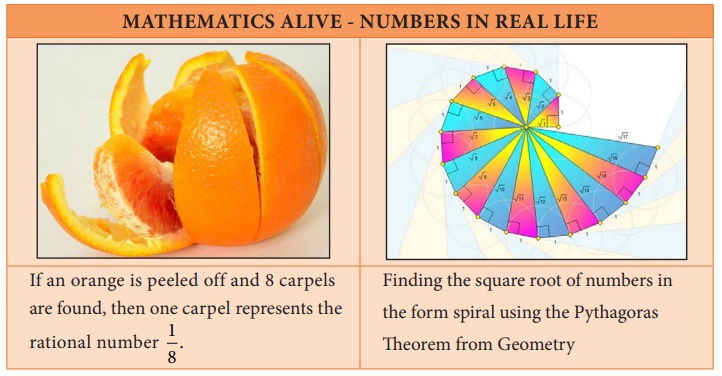Chapter 1 | 8th Maths - Numbers | 8th Maths : Chapter 1 : Numbers
Chapter: 8th Maths : Chapter 1 : Numbers
Numbers
UNIT 1
NUMBERS

Learning Objectives
• To understand the necessity for extending
fractions to rational numbers, to represent rational numbers on the number line
and to know that between any two given rational numbers, there lies many rational
numbers.
• To learn and perform the four basic
arithmetic operations and solve word problems on rational numbers and simplify expressions
with atmost three brackets.
• To understand the properties of rational
numbers.
• To compute the square, the square root,
the cube and the cube root of numbers.
• To make a rough estimate of the square roots and the cube roots
of numbers.
• To express numbers in exponential form and understand the laws
of exponents with integral powers.
• To identify and express the numbers in scientific notation.
Introduction
Let us recall
the different types of numbers which we have already learnt in our earlier classes.
When we want to count, it is natural to start with numbers 1, 2, 3, 4, 5, … Isn’t
it?
These are
all called as Counting
numbers or Natural numbers and their collection is denoted
by ℕ. The use
of three dots at the end of the list is a notation to show that the list keeps going
forever.
The natural
numbers can be visualized as a ray marked with these numbers:

Consider
the situation that yesterday my purse had money, say ₹8,
but today the purse may be empty. How many rupees are there in the purse now? How
to denote this emptiness? Here comes the concept
of zero which evolved to symbolize the idea of emptiness.
The concept of zero, though quite natural now, was not normal to early humans. Only
after hundreds of years people started thinking of it as an actual number. The difficulty was solved when the Indian
Mathematicians provided the symbol for zero. The natural numbers system with this
additional number zero became Whole numbers. The whole numbers can be visualized
now as follows:

The system
of whole numbers is denoted by w.
Even zero
was not sufficient to solve all problems. Think what happens when 4 is taken away
from 6?
Draw a number
line up to, say 9. Mark 6 by a dot on it.

We know that,
to subtract 4, we need to go 4 steps to the left side from 6. We will land on 2
and so the answer is 2. But what will happen if we want to subtract 6 from 4? This
situation is where the humans needed (and created) negative numbers.

But, how
can a number be negative? Simple! Just think of them as numbers less than zero.
Including the negative integers with the whole numbers, we get the list of numbers
called the Integers. The integers consist of zero, the natural numbers and the
negatives of the natural numbers and it consists
a list of numbers that stretch in either direction without end. The entire collection
of integers is denoted by ℤ.
MATHEMATICS ALIVE - NUMBERS
IN REAL LIFE

If an orange is peeled off and 8 carpels are found, then one carpel represents the rational number 1/8.
Finding the square root of numbers in the form spiral using the Pythagoras
Theorem from Geometry
Related Topics